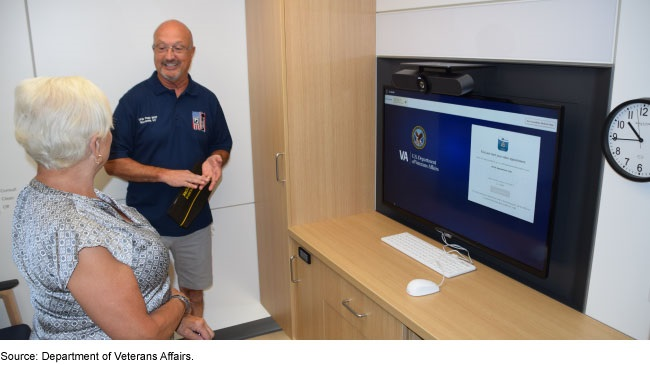Veterans Health Care: VA's Video Telehealth Access Program Would Benefit from Performance Goals and Measures
Fast Facts
The Veterans Health Administration has significantly expanded its telehealth services—offering health care appointments via video, for example. Telehealth can help veterans avoid traveling long distances for care, including those living in rural areas.
In 2019, VHA launched a program to help veterans who don't have internet access get telehealth services by providing private locations equipped with high-speed internet. But in 2022 and 2023, 14 of 24 locations had no visits. While VHA plans to expand the program, it hasn't established how it will assess whether the program is making progress.
We recommended that VHA address these issues.
Veterans Health Administration Telehealth Access Program

Highlights
What GAO Found
The Veterans Health Administration (VHA) has programs to help address veterans' barriers to accessing telehealth. These programs include the Accessing Telehealth at Local Area Stations (ATLAS) Pilot Program. Through ATLAS, VHA partners with non-Department of Veterans Affairs (VA) organizations, including veterans service organizations, to provide private locations with the technology for veterans to have video visits with VHA providers. GAO found that 14 of 24 ATLAS sites active at the time had no veteran visits in fiscal years 2022 and 2023. For the sites that did have visits, VA medical center officials said they helped those veterans who lacked broadband access telehealth and avoid barriers such as long travel distances to VA medical centers.
Veterans Health Administration's (VHA) Accessing Telehealth through Local Area Stations (ATLAS) Program

VHA officials described changes they are making to the ATLAS Program, including transitioning it from a pilot program to a grant program. However, VHA has not measured ATLAS Program effectiveness on an ongoing basis, due to a lack of performance goals and related measures. Setting goals and measures—consistent with GAO's leading practices for measuring performance—and using them to assess effectiveness and efficiency on an ongoing basis would help VHA determine whether it should make changes to the program. Such changes could include adjusting its strategies to address low ATLAS site usage.
VHA has established processes to monitor elements of the quality of its broader telehealth services, such as safety and timeliness, on a regular basis. For example, VHA has standards and measures related to these elements and meets quarterly with its regional networks to discuss their performance. VHA also has efforts underway to develop measures to assess veterans' health outcomes via telehealth compared to in-person care. Officials from selected medical centers and regional networks said that these processes and VHA's collaborative approach have helped improve telehealth quality.
Why GAO Did This Study
VHA telehealth services have expanded significantly in recent years, including during the COVID-19 pandemic. Such services include programs designed to help veterans who may lack broadband or internet-connected devices, such as rural veterans, have video telehealth visits with VHA providers.
The Consolidated Appropriations Act, 2023, includes a provision for GAO to study VHA's telehealth services. This report addresses, among other things, (1) VHA's actions to help address barriers to accessing VHA video telehealth; and (2) VHA's efforts to assess the quality of its telehealth services.
GAO reviewed VHA data, such as telehealth performance and use data for fiscal years 2022 and 2023 (the most recent complete years of data); and interviewed officials from VHA's Office of Connected Care and other relevant VA offices, four VA medical centers and their regional networks selected for variation in telehealth use, rurality, and geography, and four veterans service organizations.
Recommendations
GAO is making two recommendations for VHA to 1) develop performance goals and related measures for the ATLAS program that reflect leading practices and 2) use these goals and measures to assess the effectiveness and efficiency of the ATLAS program on an ongoing basis. VA concurred with both recommendations and identified planned actions to address them.
Recommendations for Executive Action
| Agency Affected | Recommendation | Status |
|---|---|---|
| Office of the Under Secretary for Health | The Under Secretary of Health should ensure the Office of Connected Care develops performance goals and related measures for the ATLAS Program that are objective, quantifiable, and measurable. (Recommendation 1) |
In June 2025, VA provided documentation to GAO showing that the Office of Connected Care (OCC) has approved three performance goals and related measures and disseminated them to national ATLAS sites for implementation beginning in Fiscal Year 2026. The measures will be used by OCC's Quality Team as part of the Conditions of Participation program for telehealth, which is responsible for ensuring continuous monitoring and oversight of the quality of telehealth care delivered at participating Veterans Integrated Service Networks (VISNs). According to VA documentation, the three goals and related measures will be used to assess (1) taxpayer return on investment, (2) patient experience, and (3) provider experience. VA "Measures of Success" documentation includes definitions of each of the goals and performance measures, demonstrating that the goals are objective, quantifiable, and measurable. By implementing these performance goals and related measures, VA will be better able to measure ATLAS program effectiveness on an ongoing basis.
|
| Office of the Under Secretary for Health | The Under Secretary of Health should ensure the Office of Connected Care uses the information collected for the performance goals and measures to assess program effectiveness and efficiency on an ongoing basis and make any needed improvements. (Recommendation 2) |
As of December 2024, VA stated that the Office of Connected Care (OCC) is working with the Veterans Experience Office to evaluate the ATLAS program and has identified three aims for a national evaluation of the ATLAS program: (1) understand ATLAS program users versus non-users; (2) evaluated the impact of ATLAS services on veteran satisfaction, cost, quality, and utilization, and (3) assess factors impacting adoption, implementation, maintenance, and sustainability. OCC plans to complete the evaluation by September 2025.
|
